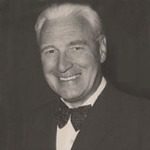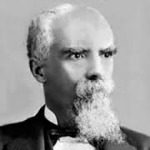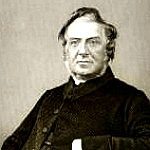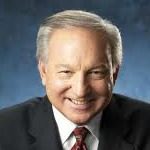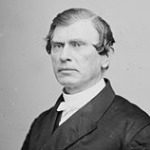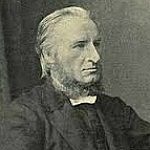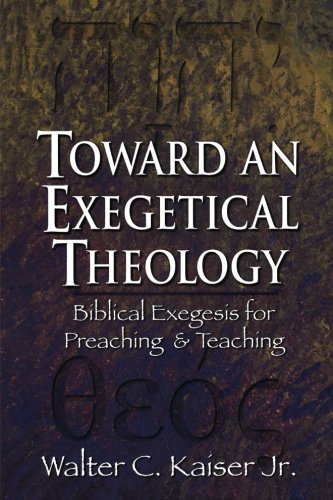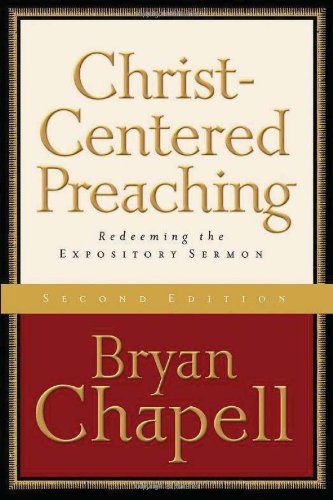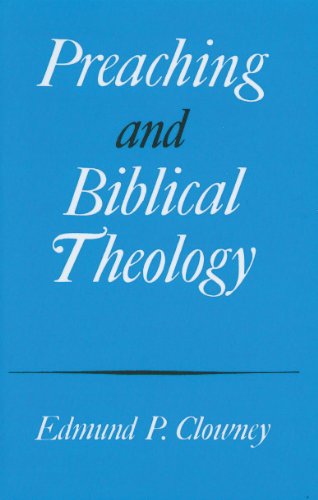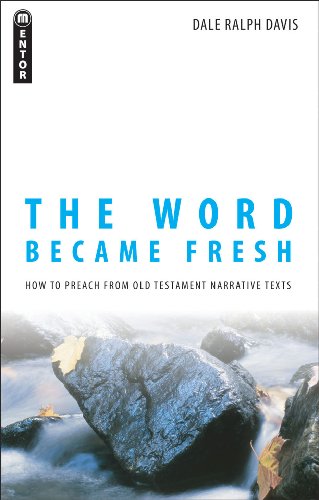Quotes about Preaching-Perspective
No man who is full of himself can ever truly preach the Christ who emptied Himself.
It is an obvious error for all to see in those ministers of the Church who make such a wide gulf between their preaching and their living. They will study hard, to preach exactly, and yet study little or not at all to live exactly. All the week long is little enough to study how to speak for two hours; and yet one hour seems too much time to study how to live all the week. They are loath to misplace a word in their sermons; yet they think nothing of misplacing affections, words, and actions in the course of their lives. Oh, how curiously I have heard some men preach, and how carelessly have I seen them live!
Screw the truth into men’s minds.
A Puritan Golden Treasury, compiled by I.D.E. Thomas, by permission of Banner of Truth, Carlisle, PA. 2000, p. 222.
I preached as never sure to preach again and as a dying man to dying men.
The first heart God’s Word needs to reach is that of the preacher. There will be no benefit to our people from expository preaching unless we ourselves are being impacted by the Scripture we are preparing to preach. It is imperative, when we are dealing with the biblical text, that we are personally changed by it.
Preaching for God’s Glory, Crossway, 1999, p. 34. Get this book!
The young preacher has been taught to lay out all his strength on the form, taste, and beauty of his sermon as a mechanical and intellectual product. We have thereby cultivated a vicious taste among the people and raised the clamor for talent instead of grace, eloquence instead of piety, rhetoric instead of revelation, reputation and brilliancy instead of holiness.
He has his back to the world, his face toward heaven and a Book in his hand.
To love to preach is one thing, to love those to whom we preach quite another.
Quoted by Curtis C. Thomas, Practical Wisdom for Pastors, Crossway Books, 2001, p. 100.
Some preachers never appreciate the compliment given them when a saint disagrees with the pastor’s exposition of a text. At least the Christian under his care is devoted more to Scripture than to the man in the pulpit. Under his ministry the child of God has reached a maturity to think through issues for himself and has imbibed a Berean spirit (Acts 17:11).
The Shadow of the Cross – Studies in Self-Denial, 1981, p. 61-62, by permission Banner of Truth, Carlisle, PA.
Our forebears back in the camp meeting days used to say that if people left a meeting talking about what a wonderful sermon the preacher gave or how beautifully the singers sang, the meeting had failed. But if people went home saying thing like "Isn’t God good? He met me tonight in such a wonderful way," it was a good meeting. There was to be no sharing the stage with the Lord.
If it is important that we learn to know the condition of the hearts of our hearers, the best place to begin is, of course, with our own hearts. Apply the Word there, and we will soon learn to be like surgical attendants: our exposition of the text will become like sterilized knives, perfectly tooled, which we hand to the Spirit for the precise spiritual surgery that our people actually need.
Brethren, it is easier to declaim against a thousand sins of others, than to mortify one sin in ourselves.
A Puritan Golden Treasury, compiled by I.D.E. Thomas, by permission of Banner of Truth, Carlisle, PA. 2000, p. 191.
It is not with us, as with other labourers: they find their work as they leave it, so do not we. Sin and Satan unravel almost all we do, the impressions we make on our people’s souls in one sermon, vanish before the next.
A Puritan Golden Treasury, compiled by I.D.E. Thomas, by permission of Banner of Truth, Carlisle, PA. 2000, p. 193.
There are many reasons why pastors must preach from the Old Testament:
1. The Old Testament is part of the Christian canon.
2. It discloses the history of redemption leading to Christ.
3. It proclaims truths not found in the New Testament.
4. It helps us understand the New Testament.
5. It prevents misunderstanding of the New Testament.
6. It provides a fuller understanding of Christ.
The Christian’s life should put his minister’s sermon in print.
A Puritan Golden Treasury, compiled by I.D.E. Thomas, by permission of Banner of Truth, Carlisle, PA. 2000, p. 195.
The devil will let a preacher prepare a sermon if it will keep him from preparing himself.
Popularity has slain more prophets of God than persecution ever did.
A preacher should have the mind of a scholar, the heart of a child and the hide of a rhinoceros. His biggest problem is how to toughen his hide without hardening his heart.
Quoted by Curtis C. Thomas, Practical Wisdom for Pastors, Crossway Books, 2001, p. 138.
There is no one gift which offers so strong a temptation both to vanity and to pride – as that of public speaking. If the orator really excels, and is successful, he is the immediate spectator of his success, and has not even to wait until he has finished his discourse; for although the decorum of public worship will not allow of audible tokens of applause, it does of visible ones – the look of interest, the tear of penitence or of sympathy, the smile of joy, the deep impression on the mind, the death-like stillness, cannot be concealed – all seem like a tribute of admiration to the presiding spirit of the scene; and then the compliments which are conveyed to his ear, after all the silent plaudits which have reached his eye – are equally calculated to puff him up with pride. No men are more in danger of this sin than the ministers of the Gospel; none should watch more sleeplessly against it.
When a minister goes into the pulpit, he is a shepherd in the act of feeding, and if every minister had borne this in mind, many a sermon would have been other than it has been. The curse of the pulpit is the superstition that a sermon is a work or art and not a piece of bread or meat
I have never once feared the devil, but I tremble every time I enter the pulpit.
There is something radically wrong with dull and boring preachers. How can a man be dull when he is handling such themes? I would say that a ‘dull preacher’ is a contradiction in terms; if he is dull he is not a preacher. He may stand at the pulpit and talk, but he is certainly not a preacher. With the grand theme and message of the Bible dullness is impossible. This is the most interesting, the most thrilling, the most absorbing subject in the universe; and the idea that this can be presented in a dull manner makes me seriously doubt whether the men who are guilty of this dullness have ever really understood the doctrine they claim to believe, and which they advocate. We often betray ourselves by our manner.
Preachers and Preaching, Zondervan, 1971, p. 87. Get this book!
A sermon is meant to be a proclamation of the truth of God as mediated through the preacher. People do not want to listen to a string of quotations of what other people have thought and said. They have come to listen to you; you are the man of God, you have been called to the ministry, you have been ordained; and they want to hear this great truth as it comes through you, through the whole of your being. They expect it to have passed through your thought, to be a part of your experience; they want this authentic personal note.
Preaching and Preachers, Zondervan, 1972, p. 222. Get this book!
The greatest of all the temptations that assail a preacher is pride. Pride, because he is set up there almost on a pedestal. He is standing in a pulpit, he is above the people, all of whom are looking to him. He has this leading place in the Church, in the community; and so his greatest temptation is that of pride. Pride is probably the deadliest and the most subtle of all sins, and it can assume many forms; but as long as one realizes this all is well.
Preaching and Preachers, Zondervan, 1972, p. 256. Get this book!
What is the rule then? It is: be natural; forget yourself; be so absorbed in what you are doing and in the realization of the presence of God, and in the glory and the greatness of the Truth that you are preaching, and the occasion that brings you together, that you are so taken up by all this that you forget yourself completely. That is the right condition; that is the only place of safety; that is the only way in which you can honour God. Self is the greatest enemy of the preacher, more so than in the case of any other man in society. And the only way to deal with self is to be so taken up with, and so enraptured by, the glory of what you are doing, that you forget yourself altogether.
Preachers and Preaching, Zondervan, 1972, p. 264. Get this book!
There is nothing like it. It is the greatest work in the world, the most thrilling, the most exciting, the most rewarding, the most wonderful. I know of nothing comparable to the feeling one has as one walks up the steps of one’s pulpit with a fresh sermon on a Sunday morning or a Sunday evening, especially when you feel that you have a message from God and are longing to give it to the people. This is something that one cannot describe.
Preaching and Preachers, Zondervan, 1972, p. 297. Get this book!
The work of preaching is the highest and greatest and most glorious calling to which anyone can ever be called.
Preaching usually represents one-way communication. When pastors are taught how to preach but do not learn other forms of communication, they are severely handicapped. When they express stress and tension in the congregation, they revert to the form of communication they know best, and that is preaching. Not listening, mind you, but preaching. We [as pastors] have learned well how to speak our opinions, but we have not learned how to hear or respond equally well to the opinions and positions of others. Often, once we stake out a position within a conflict scenario, we are immovable.
Leaders on Leadership, 1997, p. 113, Gospel Light/Regal Books, Ventura, CA 93003, Used by Permission.
The pew cannot control the pulpit. We cannot deliver ‘demand led’ preaching because no one demands the Gospel.
We ministers are weak, common, plain, fragile, breakable, dishonorable, and disposable clay pots who should be taking the garbage out – but instead we’re bringing the glory of God to our people (2 Corinthians 4:7).
Again, men tell us that our preaching should be positive and not negative, that we can preach the truth without attacking error. But if we follow that advice we shall have to close our Bible and desert its teachings. The New Testament is a polemic book almost from beginning to end… It is when men have felt compelled to take a stand against error that they have risen to the really great heights in the celebration of the truth.
I would not give much for all that can be done by sermons if we do not preach Christ by our lives.
I never preach a sermon without thinking that possibly the Lord may come before I preach another.
The preparation for the public ministry of the Word is even more excellent than preaching in church. To live in constant communion with the Lord, and to be habitually and frequently in meditation over the truth is its own reward.
The Autobiography of George Muller, 1984, p. 33. All quotations taken from books published by Whitaker House are used with permission of the publisher. Whitaker House books are available at Christian bookstores everywhere. Get this book!
Preaching must pump his heart until he lives and breathes the message. The message will hound him, drive him, even explode within him. So great will be the desire to preach that he will find it difficult to wait for the next time to deliver the message of God (Michael Tucker).
How can Christian pastors hope to feed their flock on a well-balanced spiritual diet if they completely neglect the 39 books of Holy Scripture on which Christ and all the New Testament authors received their own spiritual nourishment (Gleason Archer)?
Underlying the preaching of the Puritans are three basic axioms:
1. The unique place of preaching is to convert, feed and sustain.
2. The life of the preacher must radiate the reality of what he preaches.
3. Prayer and solid Bible study are basic to effective preaching.
Lack of intensity in preaching can only communicate that the preacher does not believe or has never been seriously gripped by the reality of which he speaks – or that the subject matter is insignificant.
Which receives the greatest attention: the ornamentation of your words and phrases, or prayer for empowerment from the Holy Spirit? Which is your greater focus: exciting pleasure in the people and praise for the preacher, or reducing the impenitent to tears of contrition and repentance? After which does your heart clamor: the pleasure of knowing that your sermon has been remarkably good, or joy in seeing your people radically affected by the truth of God?
Called by God to preach!… Commissioned of God to teach the word! A herald of the great King! A witness of the Eternal Gospel! Could any work be more high and holy? To this supreme task God sent His only begotten Son. In all the frustration and confusion of the times, is it possible to imagine a work comparable in importance with that of proclaiming the will of God to wayward men?
[The preacher’s] throne is the pulpit; he stands in Christ’s stead; his message is the word of God; around him are immortal souls; the Savior, unseen, is beside him; the Holy Spirit broods over the congregation; angels gaze upon the scene, and heaven and hell await the issue. What associations, and what vast responsibility.
Some of us who have preached the Word for years, and have been the means of working faith in others and of establishing them in the knowledge of the fundamental doctrines of the Bible, have nevertheless been the subjects of the most fearful and violent doubts as to the truth of the very gospel we have preached.
If I did not believe in the infallibility of Scripture – the absolute infallibility of it from cover to cover, I would never enter this pulpit again!
My deacons know well enough how, when I first preached in Exeter Hall, there was scarcely ever an occasion in which they left me alone for ten minutes before the service, but they would find me in a most fearful state of sickness, produced by that tremendous thought of my solemn responsibility. I am compelled to put my responsibilities where I put my sins, on the back of the Lord Jesus Christ.
The man who cannot weep cannot preach. At least, if he never feels tears within, even if they do not show themselves without, he can scarcely be the man to handle such themes as those which God has committed to his people’s charge.
“You preached well,” said a friend to John Bunyan one morning. “You are too late,” said honest John, “The devil told me that before I left the pulpit.”
And seldom if ever do I leave the pulpit without a sense of partial failure, a mood of penitence, a cry to God for forgiveness, and a resolve to look to Him for grace to do better in the future.
When intimidated by who’s sitting in the audience, we should remember the King of Kings is also here, and it’s his message.
The man who studies theology, and especially he who studies dogmatics, might watch carefully whether he increasingly does not think in the third rather than the second person. You know what I mean by that. This transition from one to the other level of thought, from a personal relationship with God to a merely technical reference, usually is exactly synchronized with the moment that I no longer can read the word of Holy Scripture as a word to me, but only as the object of exegetical endeavors. This is the first step toward the worst and most widespread ministers’ disease. For the minister frequently can hardly expound a text as a letter which has been written to him, but he reads the text under the impulse of the question, How would it be used in a sermon?
In the New Testament there is a fine distinction between teaching and preaching. The preacher is described as more of a “herald” (see 1 Tim. 2:7; 2 Tim. 1:11). He is to herald forth the good news, much as a town crier would enthusiastically announce good news. Good teaching will have some aspects of heralding about it, and it should involved some motivation and application. Good preaching will certainly involve teaching also, but preaching does not stop there. Preaching also involves a dynamic that strongly calls for actions, whether it is a call to repentance and faith, a call to service, or a call to carry the Gospel to others.
Practical Wisdom for Pastors, Crossway Books, 2001, p. 68. Used by Permission. Get this book!
The best pastor is always the one who is willing to sit under his own teaching.
Forward in When Sinners say, “I Do,” Dave Harvey, Shepherd Press, 2007, p. 12, Used by Permission.
I believe in comforting the afflicted and in afflicting the comfortable.
Only once did God choose a completely sinless preacher.
